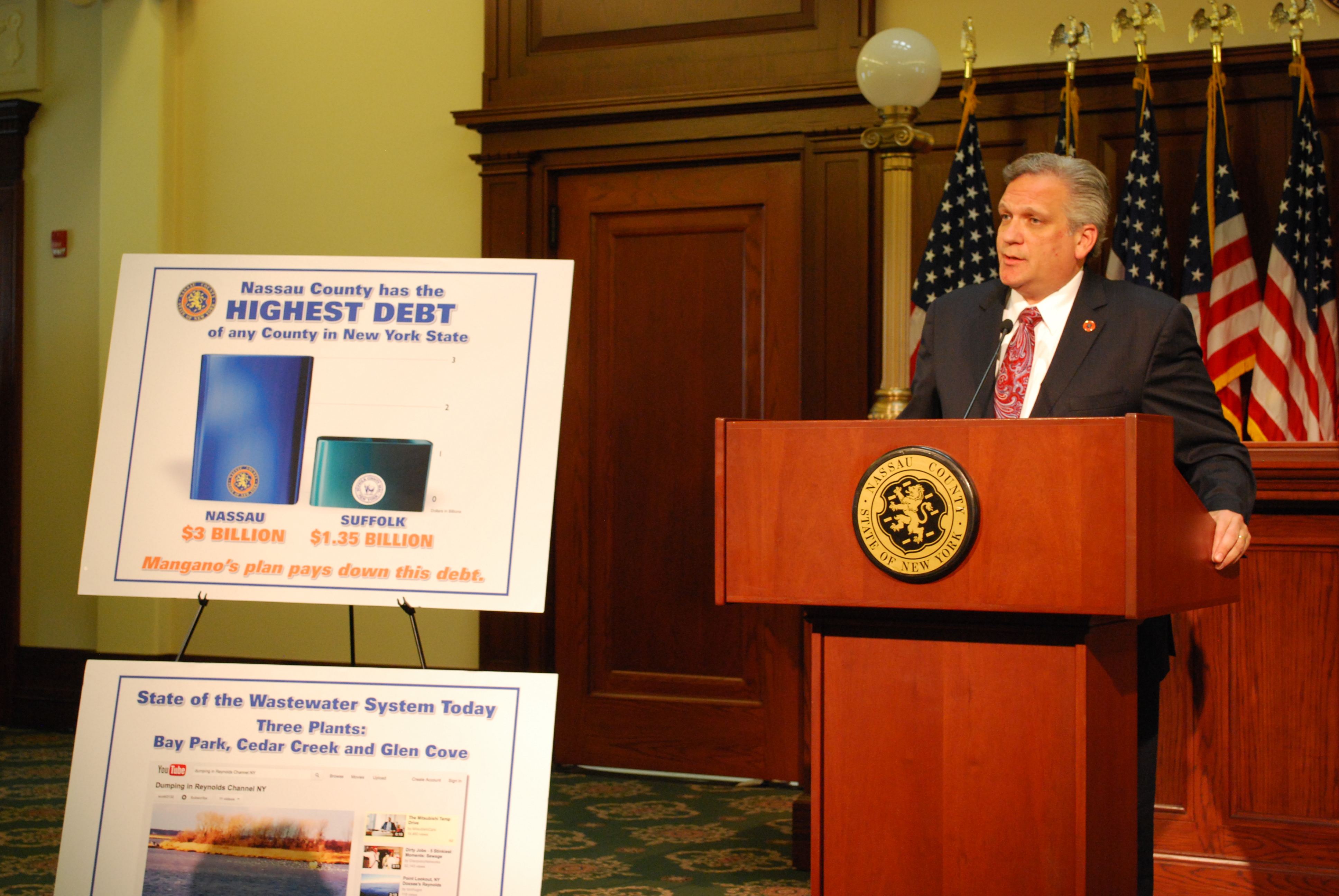

Nassau County Executive Ed Mangano touts his Debt Reduction and Sewer Stabilization Plan to reporters May 3 in Mineola. As part of the proposal, Nassau would enter into a public-private partnership with United Water, a subsidiary of French water giant Suez Environnement, to operate and maintain its troubled sewage treatment system. (Long Island Press)
Nassau County Executive Ed Mangano announced Thursday New Jersey-based United Water as the county’s pick for the operation and maintenance of its sewage system in a “Debt Reduction and Sewer Stabilization” proposal he says could net nearly $1 billion and eliminate one-quarter of the municipality’s debt.
Mangano touted the arrangement as a possible solution to addressing two of Nassau’s “biggest problems”: its $3 billion debt, which he said is the highest in the state, and its troubled sewer infrastructure, which he said a 2009 report by state fiscal watchdog Nassau Interim Finance Authority (NIFA) warned was headed toward bankruptcy by 2014.
“This is an opportunity that we’ll be presenting to our residents, where we can pay off significant debt, create efficiencies and address the impending sewer district crisis before it becomes a fiscal crisis,” he told reporters. “The option to do nothing would be the most costly, disastrous option the county could do… This action will protect our taxpayers’ children, our bays and our ocean.”
Under the proposal, of which the selection of the operator is the first of two parts—the second being the selection of a financier for the complex transaction, which, if approved by the county legislature and NIFA would be the largest single financial deal in the county’s history—Nassau would enter into a long-term, public-private partnership with United Water, a subsidiary of French water giant Suez Environnement, one of the largest water services companies in the world.
The company would take over the operation, management, maintenance and capital improvements of the county’s three sewage treatment plants: Wantagh/Seaford’s Cedar Creek Water Treatment Control Plant and Bay Park and Glen Cove sewage treatment plants.
United Water would assume the costs of all capital improvements at the facilities, Mangano said, and his administration would impose a rate freeze through 2015 that “ensures that after that date the contractor can not pass costs on to our county that exceed the consumer price index.” His plan would allow the county to retire approximately $750 million, or 25 percent, of the county’s debt and generate millions in re-occurring savings “to hold the line on property taxes,” he said.
Mangano added that county employees currently manning those plants would not lose their jobs, but would have an option to work for United Water or “retain their position with us.” He also announced three public-information sessions regarding the proposal to inform residents about the details: May 9 at Cedar Creek; May 15 at Bay Park; and May 17 at the Theodore Roosevelt Executive and Legislative Building.
Not everyone agreed with Mangano’s rosy assessment, however. His sewer system privatization plan was panned by environmental watchdogs and economics and law experts, among others, who warned of skyrocketing rate hikes for taxpayers, less accountability and a host of other concerns—including the possibility of a “flush fee aka tax,” warned one NIFA board member—in an award-winning November 2011 Press cover story.
Nassau County Minority Leader Kevan Abrahams (D- Hempstead) blasted Mangano’s plan in an e-mailed statement shortly after the May 3 press conference.
“Mangano’s sewer proposal is a Hail Mary pass designed to provide a short-term budget fix to address the long-term fiscal mismanagement that has occurred on his watch,” the statement said. “The foreign operator he has selected to run our sewers has a track record of rates hikes and serious environmental damage in other areas where they operate in the US. This is a disastrous decision by Ed Mangano to bail himself out on the backs of Nassau taxpayers who depend on reliable and affordable sewer service.”
Similar concerns were echoed by Sam Bernhardt, Long Island Organizer for nonprofit Food and Water Watch, who along with several other privatization critics who showed up for Mangano’s press conference, waited outside the legislative building after being ushered from the room by a Nassau County police officer.
“Privatization, especially in this case, is fiscally and environmentally irresponsible and it leads to decreased accountability,” he said. “Rates are going to go up…an average of 15 percent.”
Phil Franco of Seaford, a longtime Cedar Creek watchdog, co-chair of the Cedar Creek Oversight Committee and member of the Nassau County Coalition of Civic Associations, told the Press he had a hard time believing that residents’ rates wouldn’t go up after a private, for-profit company such as United Water takes over and said he was disheartened by what he describes as a cash-grab by Mangano with long-term consequences for Nassau residents.
“I expect an increase,” said Franco. “All the research I’ve done on all the places that were privatized, in the first two or three years, it works out great. They saved a little money, things get done. Then, within seven years, they’re kicking them out…saving all kinds of millions of dollars.”
“They only have a four-year lifespan, politicians,” he added. “They’re like diapers. They need to be changed often because they freaking stink after a while.”
Jerry Laricchiuta, president of the CSEA (Civil Service Employees Association) Nassau Local 830 union, said his biggest priority is protecting the jobs of Nassau sewage system’s 265 current workers and ensuring Mangano sticks to his promise of preserving them.
“The best option would be to keep our workers, keep this a public operation and spend that money to fix the plant properly,” he told the Press. “Get everybody trained and get everybody staffed and get the machinery replaced. However, that’s not what the government feels, that’s what the union feels.
“I need to keep them working,” he said. “Mr. Mangano has agreed to work with the union to keep these folks employed. They will have a choice.”



